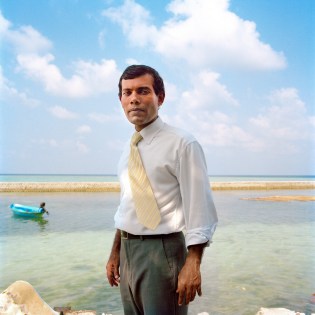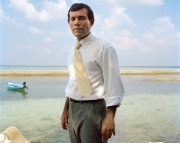
Mohamed Nasheed. (Photo by Chiara Goia.)
“A cross between paradise and paradise.” This is how Mohammed Nasheed of the Maldives describes his nation in Jon Shenk’s powerful new film, The Island President.
Shenk follows President Nasheed over a one-year period, leading up to the Copenhagen climate summit, in a beautiful, courageous, and strangely hopeful story. The film resonates all the more deeply following last month’s coup in the Maldives. The story’s ending — perhaps tragic, perhaps a powerful continuation — is today unfolding in real time.
The Maldives is a string of 2,000 islands off the coast of India, home to about 300,000 people. The highest point in the country is only a few feet above sea level. Until 2008, the islands had been under dictatorial rule for decades.
After returning home from college in Britain, in the late ’80s, Nasheed became an activist for democratic reform. He was imprisoned 12 times, and tortured, enduring 18 months of solitary confinement. In 2008, he led the nation to free and fair elections, winning the presidency.
Shenk, with unprecedented access to a head of state, films a year-long journey of this charismatic, newly elected president. With climate change a clear and present threat to the very existence of his nation, Nasheed begins speaking out globally, and passionately, for all those on the front line of climate change. Finally, he arrives in Copenhagen to play a pivotal role in crafting a global climate deal in 2009.
This is the best film dealing with global warming in years. It is a story of classical proportion: of true heroism, courage and nobility, of eloquent soliloquy, of intimate moments, and of political intrigue, compromise, and betrayal.
The film is also visually stunning. The vast blue ocean is both a serene paradise, and a powerful, threatening force, driving Nasheed’s political urgency. The Maldives capital, Malé, looks like an oasis of buildings rising out of the ocean. When asked by a reporter what was his plan B, should there be no action to slow global warming, Nasheed responds, “We will die.”
Shenk follows Nasheed in strategy sessions with his cabinet as the team seeks to leverage their moral argument as the first victims of climate change, canaries in the coal mine. Nasheed gives speeches, and makes his case with heads of states and ministers at the U.K. Parliament, at the U.N. General Assembly, in India, and finally — during the dark, crushing days of Copenhagen.
I won’t spoil the ending, though it does surprise. I will say that this is a movie for a post-Copenhagen world. Copenhagen put a brutal end to a naïve view that the leaders of the world, pushed forward by a moral imperative, would overcome petty domestic politics and sign an enforceable deal to cut global emissions by 80 percent over the next 40 years. Instead, the meeting advanced a new framework of what could be a race to the top, anchored by national commitments, and driven by domestic political organizing, in the U.S., China, India, Europe, and Brazil.
This approach will be insufficient to save the people of the Maldives. But it is a start, and we are not done yet.
Last month, just after I screened the movie, President Nasheed was forced at gunpoint to resign from his office. Political opponents seized on the economic crisis and fundamentalists objections to Nasheed’s modernizing Islam. At clear and ongoing risk to his life, Nasheed decided to remain in the country, writing, speaking, leading marches, and fighting for democracy.
And this is the enduring lesson from the movie. President Nasheed and thousands of others in the Maldives understand that their land and lives are threatened both by the rising seas, and by the corrupt politics of business as usual. They continue to fight for both democracy and climate justice, in the face of imprisonment, beating, torture, and murder.
Back here in the U.S., there is no outside force stopping any one of us from declaring our candidacy to run as a clean energy/clean money candidate, for mayor, or city council, or the state legislature or Congress. There is nothing stopping us from starting a green team in our business or workplace, and driving sustainability changes there from the ground up.
And maybe, like this island president, we don’t win the first time, and maybe our victories are followed by setbacks. Nevertheless, action at this scale, sustained, by all of us, is what must happen to change the future.
New York City, says Nasheed, is no higher than the Maldives. A cross between paradise and paradise: this is where each of us lives, and that we all must defend.
Check out the screening schedule to find out if The Island President is coming to your town soon.
Watch the trailer:


